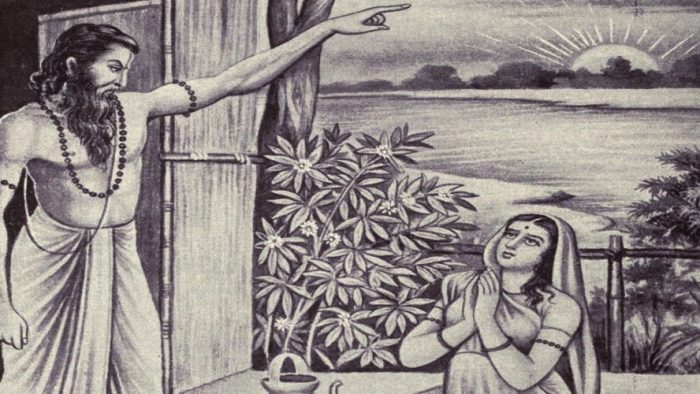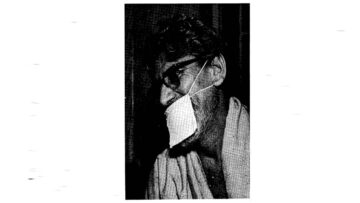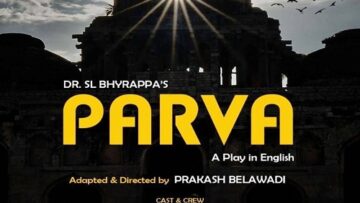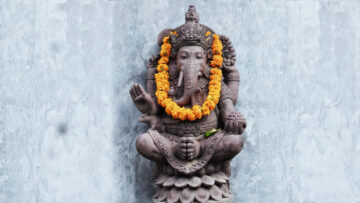Adi Parva of the Mahabharata is well known as a set of chapters building an ancestral context leading to the conflict between Kauravas and Pandavas. But it builds a philosophical context too. The fundamental philosophical concerns of the Purushartha guides every chapter, episode and the sequence. The initial chapters narrate episodes where establishing the larger perspective of life in terms of Srishti-Sthiti-Laya and the Purusharthas. Every story then is arranged to represent how an underindulgence or an overindulgence results in some consequences and what then is done to restore balance. The great conflict between the Kauravas and Pandavas then is multiple indulgences from different directions going hay-wire eventually leading to the annihilation. Lest the philosophical context is lost – there are ancestral episodes interspersed in the beginning, end as well as throughout the great conflict itself. One such beautiful story is about the Sage Jaratkaru and his overindulgence in renunciation. It was about to lead to a disaster but was averted in time.
At the Naimisharanya, while narrating the ancient stories to Shaunaka and other sages, Ugrashrava Souti makes a mention of the illustrious Sage Jaratkaru and his son Astika. The latter brought an end to the Sarpa Yagna of King Janamejaya. The sages of Naimisharanya become very interested to know the story of Astika in its detail. The great Souti pauses to take his narration in the direction of Astika. He had heard this story directly from his father Lomaharshana, at the very same Naimisharanya, in a gathering of sages of an earlier time, before he heard it from Sage Janamejaya. Such was the greatness of Astika in the tradition. Before he gets to Astika, Sauti begins with the story of his great father – Sage Jaratkaru, the focus of this article.
Jaratkaru was a tapaswi of an extreme order of austerity. He was a strict brahmachari among sages, ate very little and in rhythm. He was in penance and meditation all the time taking breaks for the absolute necessary alone. In particular, he belonged to a kula that followed a parampara called Yayavara. Yayavaras never stayed at a place, moved from village to village but very strictly followed Agnihotra and other rituals part of the life of brahmana. His performance of his Vrata was of a strict compliance to the austerity of his parampara. He was full of divine powers. But he was getting old, his body growing weak and was without an offspring.
Once Jaratkaru decided to go on a teerthayatra. However, that did not change his adherence and austerity. Every evening he stayed wherever he was, ate what was available and if nothing lived on air. He had won over the need to sleep, for months he stayed without his eyelids tiring without rest. As he moved from village to village, in one of the places, he saw a moving spectacle. Over a thin branch of a tree, a few sages hung down from their feet with their heads towards the deep precipice. They were weak without food, without any vigor and clearly crying for help. A stunned Jaratkaru was willed with concern and enquired. “Oh revered ones, accept my respects. Who are you? Why have you met such a terrible fate? You are hanging on a very thin branch supported by a root that could simply give way with a single bite of a rat. What is to be your fate after your fall?. I am eager to serve you in your times of extreme distress. Please tell me what I must do. I have performed penance of the highest order and magnitude. I have attained powers which I would like to offer to you to relieve you from this ill fate. Please tell me – should I offer you a fourth of my tapas, a third or even half. Why half? If you were to be relieved from this fate, I would give away my entire attainments from all my tapas. I am only concerned about your well being”.
The sages quipped. “Oh great tapaswi, you already seem to getting towards old age. You are a brahmachari. We appreciate your offering to save us. But please know that your attainments from your penance is of no use to us. We ourselves have performed immense austerities with special attainments. But please know that all that is of no use to us today. We are full of anguish and our minds are giving away. We belong to a vamsha of Yayavara Brahmanas. Our fate is hanging in balance like this because of our descendant called Jaratkaaru. He is not a small man, no doubt he is great tapaswi. Who would know more about Vedas and Vedangas than him? He has won over his senses. The great man that he is, his observance of austerities is of the highest order. But we the unlucky have him, an ill fated one, as our descendant. He is so engrossed in his tapas that he has no desire to continue the lineage, no intention of getting married. He craves for his tapas. He simply does not want anything else in his life. As a result, in spite of an illustrious descendant, our fate is hung in balance, as our lineage itself is to come to an end shortly without any further descendant. In spite of Jaratkaru, we are suffering and orphaned as though we have the burden of ill deeds upon us. Our ability to recollect ourselves is failing. But then, tf that is what it is – so be it. Ah, who are you? You are full of empathy and concern for us like one would have for a close relation. You seem to have come to console us with a purpose – we are eager to hear from you. Since you spoke with concern from your heart, we spoke of our situation to you without seeking your antecedents. In your journey, if at all you find Jaratkaru, please do convey our concern and fate to him. Please tell him that he alone can relieve us from this fate by continuing the lineage. Just as this branch is still keeping us from a final disaster, he alone is holding us from meeting a terrible end. The great Kaalpurush is going to eat away the last thread of the root holding this branch and very soon. He must know that, along with us, he too will eventually meet the same fate. All his tapas and attainments shall come to a nought”.
Jaratkaru was numb in pain. His heart was filled with grief and in that overwhelm he struggled to speak. So far he was proud of his austere life and here he was in front of his ancestors and learning that all his attainments were to go waste with the lineage coming to an end. ” Oh revered ones, that unfortunate descendant who is the cause of your misery is none other than me. You are my glorious ancestors. I hereby stand guilty in front of you willing to receive any punishment for causing this misery. I now seek your guidance on my next steps to relieve you of your misery. ”
The ancestors were pleased to see their descendent. At once they forgave him and consoled him that they are lucky enough to come face to face with him. They wondered why he was still unmarried. Jaratkaru said that he never had the desire to be married. He sought to ascend to the heavens in the same body and wanted to be in austerities until then. Hence the thought of marriage never occurred to him. The ancestors were stunned. “Oh Jaratkaru, any amount of penance cannot bring the exalted worlds that continuing the lineage brings. For our sake and your own, please enter the grihashthaashrama and continue our illustrious kula. That alone will liberate all of us. ”
Jaratkaru was moved. “Oh revered ones, I have now changed my mind. I can’t bear to see you hung on your feet this way. I shall do that which relieves your misery and brings you happiness. But I shall do it my own way and with my own conditions. I shall marry a girl of my own name, her father shall offer her to me as a bhikshaa and I will not provide for her. If these three conditions are met, Oh revered ones, I shall marry. This is the truth. If at all I find one and I am indeed blessed with an offspring, oh revered ones, I will be the very reason for you to attain brahma loka and that brings me happiness”
Jaratkaru took their leave and continued his yaatra. He actively searched for a wife but there was none to offer him one due to his age. Jaratkaru was in grief. In the end, he went to the depth of a forest and let out a great cry. “Oh the world, I am seeking a kanya in marriage. Oh the world, whoever is there in this forest, please listen to me. My ancestors are falling off into a nether world denied their exalted worlds as there is none beyond me to continue the lineage. They have directed me to marry and receive offerings. Anybody willing please come forward but know my conditions”.
This time his cry did not go in vain. Vasuki the king of Nagas, was waiting by the side for Jaratkaru to declare and seek from the world. At once, he went along with his sister to meet Jaratkaru and offered his sister in marriage. Jaratkaru, even in his deep distress, was unrelenting and expressed his conditions. A smiling Vasuki said “hey bhagwan, my sister is also Jaratkaru, exactly of your name. Just like you, she is leading a life of great tapas and austerities all the time. After marriage I shall look after you both. I have been waiting all these years and looking after her, to give her in marriage to you, so that our kula is relieved of a curse from one of our ancestors. Please accept her as your wife”. Jaratkaru added another condition. “Oh Vasuki, I am happy. At last, I can relieve my ancestors of their misery which was my doing. But let me tell you another condition of mine. She must not do anything that displeases me. The moment she does, be sure, I will leave her forever and go away”. Vasuki agreed.
Vasuki prepared a palace for them. Jaratkaru lived with his wife observing his austerities and in anticipation of an offspring. He had clearly informed her of his conditions. Jaratkaru, the wife, lived with an extraordinary sense of alertness, always thought of his happiness and always in the fear of committing a mistake that could anger her husband to leave.
In due course of time Jaratkaru became pregnant. Once, Jaratkaru, the sage, was tired and he was asleep on his wife’s lap. After long hours, the sage showed no signs of getting up even as the day was closing towards the sunset. It was the Sandhya time and an austere observant like Jaratkaru was never to miss a Sandhyavandana. Jaratkaru wondered if her worst fears were to become true. Was she to wait for her husband to wake up or was she to wake him up for his nityakarma? What would anger him? What would be the most right thing to do? After an intense dilemma and worrying for the worst, Jaratkaru decided to err on the side of Dharma. Come what may, let me not be accused of failing in my duty towards dharma – she thought. She woke up Jaratkaru and was quite certain that her husband would burn in anger. Looking at her husband, who was as graceful as the Agni himself, she said “Oh Sage, look at the beautiful sight of the Sun setting on the west. The sky is filled with the light red which is pleasing, while I wonder what is in store for me. For you, Oh great, this is the time for your upasana of the Sandhya”. So saying she gently waved her hand on his face wiping his sweat and comforting him.
Jaratkaru, the sage, though would have none of it. His lips were shaking in anger. “Oh Nagakanya, today you have insulted me to no avail. Tell me how I must tolerate this insult, I must immediately leave you and go way. Dont you know that Sun cannot set himself when a tapasvi like me is deep asleep in rest. I alerted you before marrying you that you must always please me, the violation of which shall lead to my deserting you. Is there anything to be said? You know that I have led a life of righteousness and my word is final.” Even though Jaratkaru knew that her husband would reach for the extreme in anger, facing it in reality was earth shattering to her, but she was prepared to engage him in a conversation. “Of Lord, it was not my intention to move you into anger. A righteous man like you should not be missing the upasana of Sandhya and hence I woke you. I plead you to not fill yourselves with anger on me for this.” Jaratkaru was angry and at the same time had already decided to leave her and go away. Nothing that she said made any difference to him. “Oh Naga Kanya. I have never uttered untruth. What I utter can never become a lie. Hence, I shall be leaving you. You knew that you were not to displease me at any cost. Oh good lady, I lived with you very happily. Please do convey to your brother I have left you. Do not be in grief for me leaving you”
At this, Jaratkaru realized that the time she feared most had indeed come. She wanted to say something but simply could not gather herself towards it. At last, she let her grief out in an intense cry. In the end she gathered herself and for a last time spoke to him “Oh great sage! I have served you through your intense tapas in the most righteous manner. Please remember that I am yet to receive a child from you for your ancestors to be relieved of their misery. If you leave me now, how do I answer your ancestors and Vasuki, my brother? Our entire kula is suffering because of a curse from our great ancestor Kadru. Only my son will relieve our clan of this misery. How am I to face him without an offspring? You should not be leaving me until the purpose of our marriage is entirely served.” Jaratkaru, the sage said “Oh Nag Kanya, what you say is dharma and befits yours status of being a righteous tapaswini. But you should not be worried. You are indeed graced with a child in your womb and soon you shall be a mother of a glorious son. He shall be a great tapaswi, learned in the Vedas and Vedangas and will be known in all the worlds as a righteous sage.” Thus saying Jaratkaru left his wife to deep forests for intense tapas.
Jaratkaru then approached her brother Vasuki in grief and narrated everything. Vasuki began to worry “Oh Sister, I always knew your husband to be one to slip away. But you know the purpose of me waiting for Jaratkaru for years, to give you to him in marriage. Our entire clan’s release from the curse depends on your son. I know it is not appropriate of me to directly ask you. But pray tell me, are you bearing his son in your womb – the one who will release us from this curse? I am eager to go behind your husband and seek an answer from him, but in his anger he can inflict another curse on us. Pray – tell me and relieve me from this anxiety”. In reality, Jaratkaru had narrated everything except this in her shyness. “Oh brother, You must not worry. I was equally concerned of this – just as you, hence I asked him in direct even as he was leaving me. He affirmed that I am indeed carrying a son in my womb – and nothing that he says becomes untrue.” Vasuki was relieved.
In a few days, she gave birth to a boy. He was named Astika as Jaratkaru had said “Asti” before leaving for the question raised by her – if she was pregnant with his child. He grew with the same austere orientation as his father and very soon he became a great tapaswi, a sage, learned in the Vedas and revered everywhere. He was intelligent, of divinity and very sensible – every bit of the person who would relieve the Naga clan from the curse of Kadru.
Thus ends the story of Sage Jaratkaru. Astika goes on to fulfill his destiny subsequently. I have deliberately retained the conversational nature of this episode. The central concern of this story is the denial of greater worlds to the ancestors because of Jaratkaru. The ancestors call him ‘tapOlObhi’ – one who is excessively craving for tapas, forgetting the larger purposes of life. Jaratkaru may be a great tapaswi and may be full of divine powers but neither can he enter brahmaloka nor can his ancestors because he has forsaken the most fundamental purpose that is the continuation of the lineage as he is the sole surviving in the tradition. This story is about concern for life and its richness. Our tapas, powers and attainment are meaningless if they do not add to the richness of life. Even in our renunciation and seeking Moksha, we ought to be concerned about the dynamic equilibrium of the universe – the Sthiti and its continuation. The destruction of an entire lineage weakens the dynamic equilibrium of the universe, it weakens the Sthiti. A way of life that has been shaped with so much tapas cannot be denied to the future generations just because of the excessive love for austerity of a descendent. However, Jaratkaru must achieve the continuity of the lineage within his svadharma of an extreme ascetic. A match is possible only when somebody else, in the other end of the world, is equally waiting and in the same austere path. Hence, the same name Jaratkaru – one who has overcome the enormity of the physical body through extreme austerity. There is a difference. Jaratkaru, the husband, is asked to relieve his ancestors of ill destiny. Jaratkaru, the wife, is eagerly waiting to remove the curse of an ancestor on her clan and save the future from extinction. The former is creating a future so that the efforts of the past dont go in vain. The latter is protecting the future from a past that went blind in selfishness. Hence, the concerns of the past and the future must meet purposefully from both ends in order to create a future. And Astika does it in great style. He brings back two kulas into the balance of dynamic stable equilibrium.
The concern for the Dynamic Stable Equilibrium of today – a rich, dynamic life ever in balance is always a concern of our epics. This also highlights that in every way of life an excess is possible, often it occurs and but within our tradition there is a way of this excess becoming apparent to us. There is an element of self-correction built into Indian life. Jaratkaru meeting his ancestors in a Teerthayatra and Vasuki waiting for years to give his sister in marriage to Jaratkaru represent the same. Jaratkaru, cannot abandon his svadharma, a love of renunciation and extreme austerity but he is not void of concern for his ancestors achieving their desired state. That is the essence of Indian life. Individual idiosyncrasies are overcome by the philosophical, spiritual concerns and the larger design of life.
Disclaimer: The opinions expressed in this article belong to the author. Indic Today is neither responsible nor liable for the accuracy, completeness, suitability, or validity of any information in the article.










